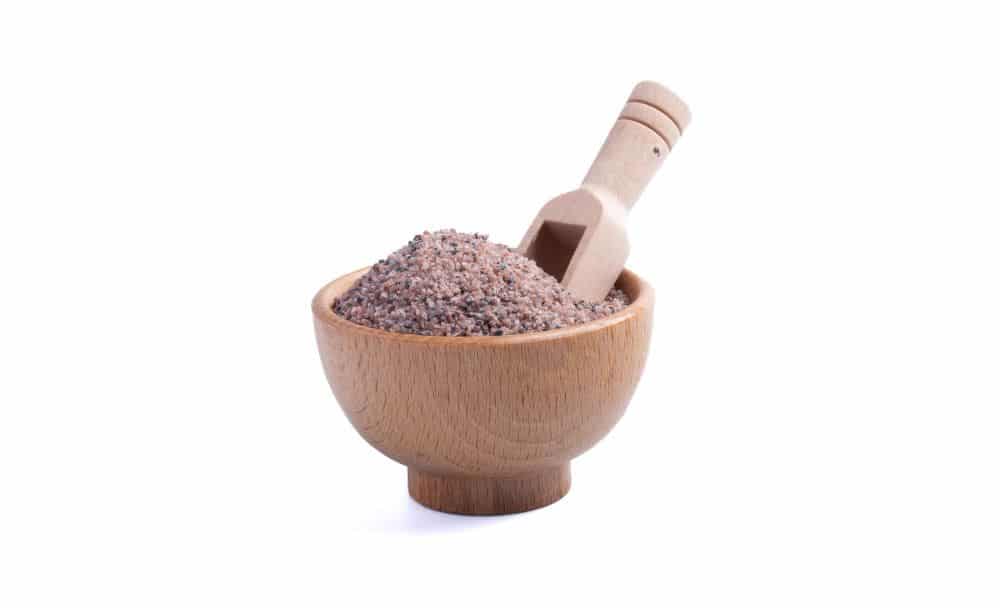Black salt, also known as Kala Namak or Himalayan rock salt, is a unique and widely used condiment in various cuisines, particularly in South Asia. It is considered a cooling spice in Ayurvedic medicine and is thus used in a variety of health issues such as indigestion, constipation, heartburn, flatulence, bloating, goiter, and hysteria, among others. It is especially popular as a laxative agent that relieves intestinal gas and improves digestion, making it a popular feature in most Asian kitchens to be used as an effective home remedy.[1] It primarily comprises sodium chloride (table salt) and contains several essential minerals, including iron, sulfur compounds, and trace elements.
Black salt is often considered a great alternative to white salt which is seen as an element that contributes to high blood pressure and other health-related issues. Black salt also has an antioxidant effect and lower Na levels than its other counterpart. [4] It is essentially a variety of Indian volcanic stone salt and a distinct sulfurous component apart from iron and other minerals that lend the salt its unique pinkish-grey color.[1] In addition to its culinary applications, black salt is recognized for its potential health benefits and therapeutic properties.
Black salt is composed of sodium chloride and traces of certain other minerals like potassium, Magnesium, magnesia, Iron in the form of ferrous sulfate and Sulphur, among others.[3]
In this article, we will delve deeper into the black salt benefits, black salt uses, dosage, side effects, and precautions to be exercised while using black salt, as well as the comparison between rock salt vs black salt.
What are the uses and benefits of black salt?
The black salt benefits are attributed to its mineral content and distinct sulfuric aroma and taste.[2] It is often employed in traditional medicine and Ayurveda for its digestive, detoxifying, and cooling properties. Here is a look at some of its most impressive benefits.
- Helps with digestion and stomach care:
The sulfur compounds in black salt are believed to stimulate the production of digestive enzymes, aiding in better digestion and relieving indigestion, bloating, and constipation without causing stomach irritation or worsening gastritis.[1]
- Improves eyesight:
Among the therapeutic black salt benefits is its ability to improve eyesight as it does not elevate the sodium content in the blood, unlike the standard white salt.[1]
- Good for the skin:
Black salt, when added to bathing water, works as a healing agent on the skin and also solves problems like cracked feet, swollen feet, athlete’s foot, and sprains.[1]
- Hair benefits:
Black salt works wonders for hair problems like receding hairline, hair fall, split ends, dandruff, and overall hair growth.[1]
- Relieves muscle spasms:
Black salt is rich in potassium and potassium can improve the functioning of your muscles. This useful mineral present in Black Salt can relax muscles and check spasms.[5]
- Serves as an anti-obesity agent:
Among the other black salt uses is its capacity to help you shed your extra pounds. The dissolving and disintegrating effect of black salt makes it highly beneficial in anti-obesity and anti-cholesterol products.[1]
- Helps in respiratory disorders:
Black salt uses encompass its potential to alleviate respiratory issues. It is frequently utilized as a natural remedy for asthma, sinus, and allergies.[1]
What are the side effects of black salt?
While black salt is generally safe for consumption, it is essential to be aware of potential side effects and precautions. When consumed in excess, there are some black salt disadvantages, and it can have specific side effects, such as hypertension, especially in patients with a history of high blood pressure.[1]
What precautions should be exercised while consuming black salt?
When it comes to consumption, it is crucial to use black salt in moderation. While it is true that the sodium content in black salt varies greatly when compared to regular white salt, making it quite beneficial, blood pressure patients cannot depend upon black salt to solve their blood pressure problems. Excessive intake of black salt may lead to increased sodium levels, which can harm individuals with high blood pressure or heart conditions.[1]
FAQs
1.Can black salt be consumed regularly?
Yes, black salt can be consumed regularly, but the recommended dosage varies depending on personal preference, health conditions, and the intended use. Therefore, it is advisable to consult a healthcare professional or an Ayurvedic practitioner to determine the appropriate dosage for your specific needs of the black salt powder.
2.How does rock salt vs black salt compare? Are black salt and rock salt the same?
When it comes to rock salt vs black salt, they are quite similar as they are both mined from Himalayan regions and are principally composed of sodium chloride. However, there are a few differences. Black salt is a pungent-smelling, purple-colored, or pinkish-grey rock salt that turns pink when pounded into black salt powder, but rock salt is naturally pink in color and mined near the Himalayas in Pakistan.
3.Why does Black Salt smell pungent?
Black salt smells pungent because of the presence of high quantities of sulfur.[6]
Conclusion
Black salt offers a distinctive flavor to dishes and possesses potential health benefits. However, it is essential to consume it in moderation and be mindful of any possible side effects or interactions with existing medical conditions or medications. In this article, we have gone into a detailed discussion of black salt uses and black salt benefits along with its potential side effects and precautions that must be exercised while consuming it.
Disclaimer:
This article has been written only to inform you about Black salt and is not medical advice. So, you must consult a doctor before using black salt for any ailment.
References:
- Comparison of nutritional composition of white and black salt
- Elemental Analysis of Condiments, Food Additives and Edible Salts Using X-Ray Fluorescence Technique
- Effects on Blood Pressure of Black Salt (Himalayan Salt) Versus Table Salt in Prehypertensive Indians
- Structural characterization of Himalayan black rock salt by SEM, XRD and in-vitro antioxidant activity
- Health Benefits of Black Salt
- DISCARD BIOCHEMICAL MALFUNCTION BY BLACK SALT THROUGH NATUROPATHY





















